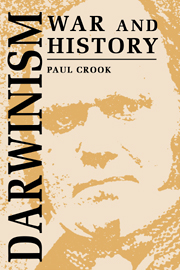 Darwinism, War and History
Darwinism, War and History Book contents
- Frontmatter
- Contents
- Acknowledgements
- Introduction
- 1 The Darwinian legacy
- 2 The age of Spencer and Huxley
- 3 Crisis in the west: the pre-war generation and the new biology
- 4 ‘The natural decline of warfare’: anti-war evolutionism prior to 1914
- 5 The First World War: man the fighting animal
- 6 The survival of peace biology
- 7 Naturalistic fallacies and noble ends
- 8 Conclusion
- Appendix: Social Darwinism
- Notes
- Bibliography
- Index
2 - The age of Spencer and Huxley
Published online by Cambridge University Press: 31 August 2009
- Frontmatter
- Contents
- Acknowledgements
- Introduction
- 1 The Darwinian legacy
- 2 The age of Spencer and Huxley
- 3 Crisis in the west: the pre-war generation and the new biology
- 4 ‘The natural decline of warfare’: anti-war evolutionism prior to 1914
- 5 The First World War: man the fighting animal
- 6 The survival of peace biology
- 7 Naturalistic fallacies and noble ends
- 8 Conclusion
- Appendix: Social Darwinism
- Notes
- Bibliography
- Index
Summary
Conflict theory
Just as Darwinism was not linked indissolubly with conflict theory, conflict theory could, and did, exist independently of Darwin. Nor was conflict theory necessarily linked with militarism, although that linkage was readily available. Definitions and interpretations of ‘conflict’, ‘struggle’ and ‘competition’ varied widely, especially when applied to individuals, groups and nations. Even those like Herbert Spencer and W. G. Sumner who took a hard-bitten, free-scrambling competitionist stance on domestic social policy – not necessarily Darwinian – drew the line at international warfare. Indeed Spencer and Andrew Carnegie – the fiercest of Social Darwinists in popular mythology, if not in fact – were notorious pacifists, while apostles of social co-operation like Lester Ward and Karl Pearson (an outspoken socialist) endorsed racial and global violence as the outcome of cosmic laws. Capitalism, in the eyes of the left a system of unbridled aggression, produced a string of cosmopolitan peace models, of which the most famous was that of the Manchester School of economics. Paradox abounded. Much depended upon context.
During the middle and late nineteenth century doctrines of biological militarism manifested themselves in western history, but encountered crucial opposition in the more liberal political cultures because such stark doctrines breached commonly held values based on conventional morality, order and legitimacy. For such reasons Anglo-American militarism, a by no means negligible phenomenon, tended to be couched less in aggressive Darwinian terms than in those of racial and imperial service and paternalism.
- Type
- Chapter
- Information
- Darwinism, War and HistoryThe Debate over the Biology of War from the 'Origin of Species' to the First World War, pp. 29 - 62Publisher: Cambridge University PressPrint publication year: 1994
- 1
- Cited by


